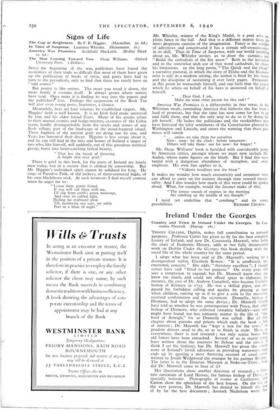Signs of Life
as. 6d.) SINCE the beginning of the war, publishers have found the economics of their trade so difficult that most of them have given up the publication of books of verse, and poets have had to turn to the periodicals, only to find that these too rarely have an " odd corner."
But poetry is like onions. The more you tread it down, the more firmly it sustains itself. It always grows where armies have nod. Once more it is finding its way into the papers and the publishers° lists. Perhaps the suspension of the Book Tax will give even young poets, beginners, a chance.
Meanwhile, here are four volumes by established singers. Mr. Higgins' field is well known. It is an Irish field made universal by him and his older friend Yeats. Many of his poems relate to their mutual cronies and hedge-masters, creatures of the Celtic scene, hardly distinguishable from the stocks and stones of any Irish village, part of the landscape of the mind-haunted island. These bagmen of the ancient gods are dying one by one, and Yeats has lamented their decay. Higgins is less savage about it, and he can still find in the inns and homes of Ireland a singer or two who, like himself, will suddenly, out of this garrulous metrical gossip, burst into heart-catching lyrical beauty, That has the knack of throwing A bright skin over grief."
There is grief in this book, for the poets of Ireland are lonely men today, lost in a society that is choked by censorship. But Mr. Higgins's individual spirit cannot be subdued for long. He sings of Paradise Park, of old jockeys, of three-cornered fields, of his own blackthorn stick. At such moments I find myself content when he urges me to: "Listen then, gentle friend,
If you will sail there with me,
I'll slip from earth's green moorings, And over its cabled light, Hailing no starboard glow Till, feathering our oars, we softly Port in a blaze of night."
Mr. Whistler, winner of the King's Medal, is a poet who es. ploits fancy to the full. And that is a different matter from the more desperate exercise of the imagination. Fancy is the wielder of adjectives and conceits,and it has a certain self-consciousness in its skill. Thus in Time of Suspense, with our'world tumbling about us, Mr. Whistler invites us to draw the curtains, and " Build the cathedrals of the fire anew." Both in the invitation and in the somewhat arch use of that word cathedrals, he shows his limitations. In the long poem, "The Quick and the Dead," a narrative pastoral, in which the story of Elisha and the Shunam. mite is told in a modern setting, the author is fired by his theme and the discipline of sustaining it over forty pages. Frequently in this poem he transcends himself, and one feels that the prayer which he utters on behalf of his hero is answered on behalf of himself.
" . . Dear God, I ask, Make me some other person for this task! "
America Was Promises is a dithyrambic in free verse, in the Whitman mode, reminding America that hitherto she has been a land of promises, but that the time has now come for her to up and fulfil them, and that the only way to do so is by doing the job herself. He lashes the politicians and the stockjobbers who have betrayed the lofty sentiments of the Constitution phrased by Washington and Lincoln, and utters the warning that those pro- mises will vanish
" .. unless we take them for ourselves Now: soon: by the clock: before tomorrow: Others will take them: not for now : for longer! "
Mr. Oscar Williams' book is heralded with considerable pomp by American critics, amongst whom we -must now include Mr. Auden, whose name figures on the blurb. But I find this verse turgid with a dangerous abundance of metaphor, and over- emphasis. His own line applies to it, " Valkyrie headlines tear the brain"
It makes me wonder how much eccentricity and ornament verse can afford to carry on the journey through time toward immor- tality. And I also wonder how much of this verse could be spoken aloud. What, for example, would the listener make of this,
" The joyous sounds of engines in the morning Are combing up the middle of my thought."
I need not underline that " combing " and its comic


























 Previous page
Previous page